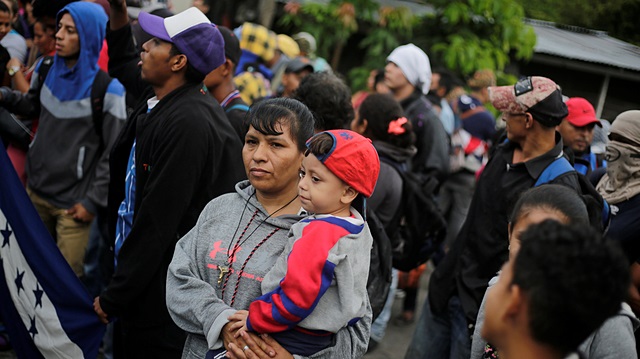
Migrants without proper documents will risk deportation, government warns
Mexico announced Thursday that it would ask the UN’s refugee agency, UNHCR, for help in processing the arrival of a caravan of up to 4,000 migrants at its southern border that is bound for the United States.
In a press release, Mexican Foreign Secretary Luis Videgaray said he would formally submit the request later that day in a meeting with UN General Secretary Antonio Guterres in New York.
“This measure aims to ensure the security and integrity of migrants -- particularly of minors, elderly people and women -- and to prevent them from becoming victims of criminal organizations dedicated to human trafficking who would put their lives at risk,” the statement said.
On Oct. 13, a thousand migrants left on foot from Honduras for the United States -- an estimated 2,500 kilometers (1,553 miles) away. On Thursday, the group, which reportedly grew to 4,000 people in Guatemala, was headed to the southern border of Mexico, with some of its members already at the border.
In a joint statement, Mexico’s Interior and Foreign Relations ministries reiterated that the migrants would not be allowed to enter the country without proper documentation.
Migrants are required to have a visa granted by Mexican authorities, and those who don’t must either individually apply for refugee status, which could imply up to 90 days of detention, or face deportation.
“We deny that the existence of a transit visa exists for people to cross the national territory,” the statement read.
A previous caravan of around a thousand migrants headed to the U.S. in April had been granted temporary visas to cross Mexico, angering U.S. President Donald Trump.
Over the past few days, Trump has made escalating threats on Twitter, saying Thursday he would use the military to "CLOSE OUR SOUTHERN BORDER!" while demanding Mexico "stop this onslaught" from reaching the U.S.
In a local radio interview on Thursday morning, incoming Mexican foreign minister Marcelo Ebrard, who will take office in December, qualified Trump’s declarations as “unsurprising, predictable and electorally motivated” in light of midterm elections due in three weeks.
President-elect Andres Manuel Lopez Obrador said Wednesday he "planned to offer more work visas for Central Americans" as soon as he is sworn into office on Dec. 1.
Hello, the comments you share on our site are a valuable resource for other users. Please respect other users and different opinions. Do not use rude, offensive, derogatory, or discriminatory language.
The floor is all yours.








